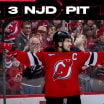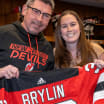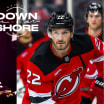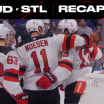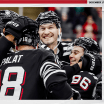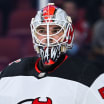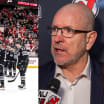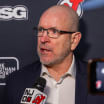For past podcast episodes, go to NewJerseyDevils.com/podcast
For this special edition of the Speak of the Devils podcast, Kim Davis and Jeff Scott of the NHL join podcast host Catherine Bogart to discuss HBSE's commitment to fighting for social justice. Kim Davis is the Executive Vice President of Social Justice, Growth Initiatives and Legislative Affairs for the NHL, while Jeff Scott is the Vice President of Community Development and Growth.
HBSE's plan includes the way the organization wants to fight systemic racism within the communities where HBSE teams play - Newark/Northern New Jersey for the Devils and Philadelphia/Camden N.J. for the 76ers. According to Davis, that is a key part of business for companies like HBSE moving forward.
"We know that a commitment to building strong and vibrant communities is a commitment to growing our fan base and growing our business. I think the commitment and the investment that the organization has made demonstrates that they understand the connection between civic engagement, community relationships, and the growth of the sport and fandom."
PODCAST: NHL's Kim Davis and Jeff Scott join the podcast
In this special edition of the Speak of the Devils podcast, Davis and Scott give their thoughts on HBSE's announcement for social justice
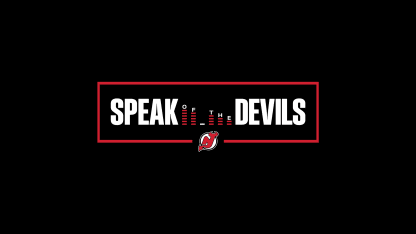
PAST DEVILS PODCASTS
SPEAK OF THE DEVILS PODCAST
NHL's Davis and Scott discuss social justice and HBSE
TSN's Craig Button discusses 2020 NHL Draft propsects
Former Devil Jamie Langenbrunner talks about his playing days
NHL.com's Mike Morreale discusses the 2020 Draft and prospects
Former Devils player Brian Gionta discusses playing days
Devils GM Tom Fitzgerald talks about promotion from Interim GM
Devils New Head Coach Lindy Ruff discusses his hiring
Binghamton Head Coach Mark Dennehy discusses off-season
1995 Cup Team Reflects on 25-year Anniversary
Hughes and Hischier look back on their Draft years
DEVILS PAUSECAST
Episode 11 - Gomez on life in Alaska and past Devils Cup wins
Episode 10 - Marshall on playing against the Devils in 2000 and for them in 2003 Cup wins
Episode 9 - Rupp looks back on his Cup-winning goal in 2003
Episode 8 - Severson on life in Kelowna during the quarantine
Episode 7 - Merkley and Schnarr on living together after arriving in the Hall trade
Episode 6 - Bastian and McLeod on their friendship and leaps in their on-ice game in 2019-20
Episode 5 - Mermis on keeping busy during the Pause
Episode 4 - Chico on live in Minnesota during the break in action
Episode 3 - Devils President Jake Reynolds on staying busy during the Pause and community involvement
Episode 2 - Carrick on his new podcast and more
Episode 1 - Welcome to the Pausecast
MORE PODCASTS
Full Archive of Devils Podcasts
Scott, who served as the Vice President of Community Investment and Grassroots for the New Jersey Devils before joining the NHL, discussed how he felt this plan would benefit the Greater Newark Community.
"In the Newark community, in the Northern New Jersey area, you know there's a desire, there's a passion, there's a thirst, there's a hunger, there's a strong opportunity for your fan base to make an extreme difference in the communities that you serve," said Scott. "It not only started with the organization understanding internally but also making sure the community feels welcome to come into
Prudential Center
, to be a part and to support the organization."
"Now is such an amazing time for this commitment to be presented, to be known, and for people to start paying attention to what's to come."
In addition to the commitment to the community, the plan laid out by HBSE also works internally within the organization to make it not only the most inclusive and diverse workplace possible but sets up infrastructure to support Black employees and employees of Color moving forward. Scott discussed how representation is key in this growth especially in inspiring the next generations.
"It's easy to define it as representation. Right representation is key in all of our growth," said Scott. "That's what's most exciting to me when I see all of these actions that are happening is that you're putting faces in front of positions where people will be able to see and relate to and engage with, as a newcomer to the hockey world."
"When I think about these action items and how this is coming together, I summarize it in one word and that's 'representation.' You know, representation on the business side is just as important as representation on the ice…new individuals into the workforce will also see a place for them in all of this and that's how the game goes, that's how our businesses become more diverse, that's how you are able to make that strong commitment back to our community. Because number one you're creating that interest and you're creating those opportunities for people to see."
Davis also discussed why it's important for strong leadership to bring about these changes.
"The essence of social impact work is the intersection of doing well and doing good. The two are intricately connected and what makes the difference is leadership," said Davis. "I think that none of this happens without strong leadership, it doesn't happen without strong leadership at the club organization-level and it doesn't happen without strong leadership at the league level. I think that is a difference-maker and that is going to be the thing that is going to propel us into the future."
During the last few months, the NHL has seen more players become vocal about social justice issues and using their platform to speak about matters off the ice. Scott explained the shift the league has seen during this time and the importance of embracing the players to do this.
"Our Commissioner has been very vocal in making sure that when our players are able to make a statement or speak from their heart, that they will not be reprimanded or held in certain regard for what they believe in and what they stand for, and that's something that's really not very common in our NHL space. You see it more in the NBA space where players are a bit more vocal. We were so pleased over the course of these past few months where you go from a space where your players aren't very vocal via social or politically driven agendas or comments and things of that nature, but we had well over 200 plus players show their support and make statements about the racial and social injustices that are happening in our communities."
This change and ability for players and organizations to feel comfortable speaking on matters of racial and social injustice did not happen overnight. Davis and her team have worked hard to build a solid foundation of learning where the NHL can be better and acting to link social justice and business together when it comes to the NHL.
"Before both the health and racial pandemics occurred, we had started a movement of listening and learning and really spending in-depth time with our clubs understanding where they are in the process of justice and social impact and the intersection of sport, and helping them to understand how this ties to the growth of their business," explained Davis. "We also did a deep study with the Brookings Institute almost two and a half years ago, Dr. Bill Fry and I co-authored a piece that talked about the shifting demographics and the implications that it would have on the sport of hockey."
"All of that work leading up to the actual health and racial pandemic was the fodder for the way this has manifested itself in our sport. And so we now use the hashtag, it's a movement, not a moment because we see this as the beginning of no turning back. This is the way our sport is going to operate going forward."




